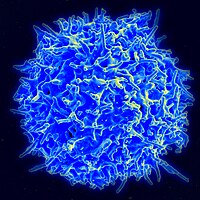
Photo from wikipedia
Objective Neonatal lungs are more tolerant to hyperoxic injury than are adult lungs. This study investigated differences in the response to hyperoxic exposure between neonatal and adult mouse lungs using… Click to show full abstract
Objective Neonatal lungs are more tolerant to hyperoxic injury than are adult lungs. This study investigated differences in the response to hyperoxic exposure between neonatal and adult mouse lungs using metabolomics analysis with capillary electrophoresis time-of-flight mass spectrometry (CE- TOFMS). Methods Neonatal and adult mice were exposed to 21% or 95% O2 for four days. Subsequently, lung tissue samples were collected and analyzed by CE-TOFMS. Pyruvate dehydrogenase (PDH) enzyme activity was determined using a microplate assay kit. PDH kinase (Pdk) 1, Pdk2, Pdk3, and Pdk4 mRNA expression levels were determined using quantitative reverse transcription-polymerase chain reaction. Pdk4 protein expression was quantified by Western blotting and Pdk4 protein localization was evaluated by immunohistochemistry. Results Levels of 3-phosphoglyceric acid, 2-phosphoglyceric acid, phosphoenolpyruvic acid, and lactic acid were significantly elevated in the lungs of hyperoxia-exposed versus normoxia-exposed adult mice, whereas no significant differences were observed with hyperoxia exposure in neonatal mice. PDH activity was reduced in the lungs of adult mice only. Pdk4 mRNA expression levels after hyperoxic exposure were significantly elevated in adult mice compared with that in neonatal mice. Conversely, gene expression levels of Pdk1, Pdk2, and Pdk3 did not differ after hyperoxic exposure in either neonatal or adult mice. Pdk4 protein levels were also significantly increased in adult mouse lungs exposed to hyperoxia and were localized mainly to the epithelium of terminal bronchiole. Conclusions Specific metabolites associated with glycolysis and gluconeogenesis were altered after hyperoxia exposure in the lungs of adult mice, but not in neonates, which was likely a result of reduced PDH activity due to Pdk4 mRNA upregulation under hyperoxia.
Journal Title: PLoS ONE
Year Published: 2020
Link to full text (if available)
Share on Social Media: Sign Up to like & get
recommendations!